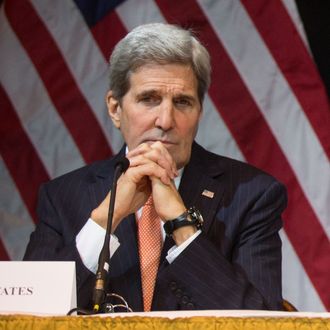
One day after ISIS-linked extremists launched an brutal series of attacks on Paris, top diplomats from more than a dozen countries agreed on an expedited plan for a political transition and cease-fire in Syria, though major issues remain.
At a joint press conference in Vienna on Saturday, Secretary of State John Kerry and Russian foreign minister Sergey Lavrov unveiled an ambitious timetable for ending the Syrian Civil War. That plan is to achieve formal talks between the Syrian government and opposition groups by January 1, a cease-fire and constitutional drafting process within six months, and UN-supervised free elections in which all Syrians — including refugees — could take part, within 18 months. “We all recognize the urgency of the moment,” Kerry said, though he also acknowledged that the deadlines would be difficult to meet.
The Wall Street Journal reports that the significant progress in Vienna surprised many Western diplomats, especially how Russia, Iran, and Saudi Arabia all got on board with the agreement. There is still plenty left to disagree about, however, particularly since the peace process is supposed include opposition groups and exclude terrorist groups, as would the cease-fire. The problem with that is while no one in the international community disagrees about groups like ISIS or the Nusra Front being terrorists, the Assad regime and its allies Russia and Iran have always tried to label most opposition groups as terrorists, too, even though many of those groups are considered legitimate by countries like the U.S. and Saudi Arabia. To try and bridge this significant divide, Jordan will lead a working group on vetting the various brigades, according to the New York Times.
In addition, while the United States continues to argue that Syria’s civil war will not end until Assad is removed from power, Russian Foreign Minister Sergey Lavrov claimed the opposite — noting how the fall of Saddam Hussein and Muammar el-Qaddafi only intensified the crises in their respective countries.
“I cannot agree, therefore, with the logic that Assad is the cause for everything,” Mr. Lavrov said. “The Paris attacks have shown, alongside with ISIS claiming responsibility for it, that it doesn’t matter if you are for Assad or against him; ISIS is your enemy, so it’s not about Assad.”
Despite these areas of continued disagreement and ambiguity, Kerry sought to emphasize the fundamental solidarity between the U.S. and its diplomatic partners on Saturday.
“We do agree on this: It is time for the bleeding in Syria to stop. It is time to deprive the terrorists of any single kilometer in which to hide,” he said. “It is time that we come together to help the Syrian people embark on the difficult but extraordinarily high imperative of rebuilding their country.”






























